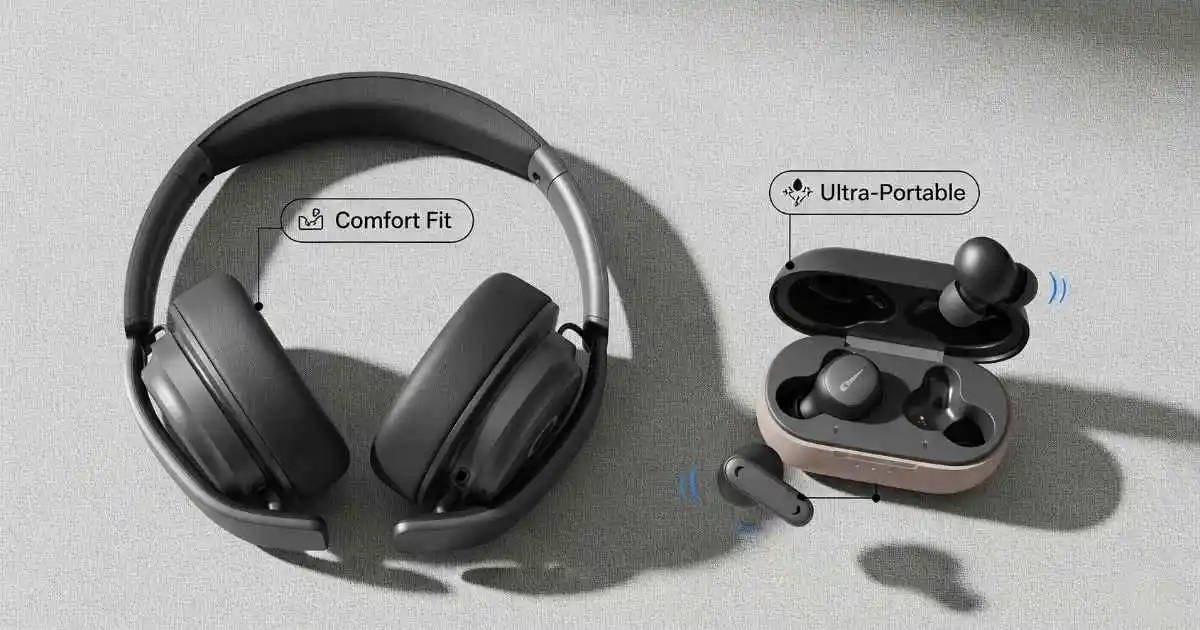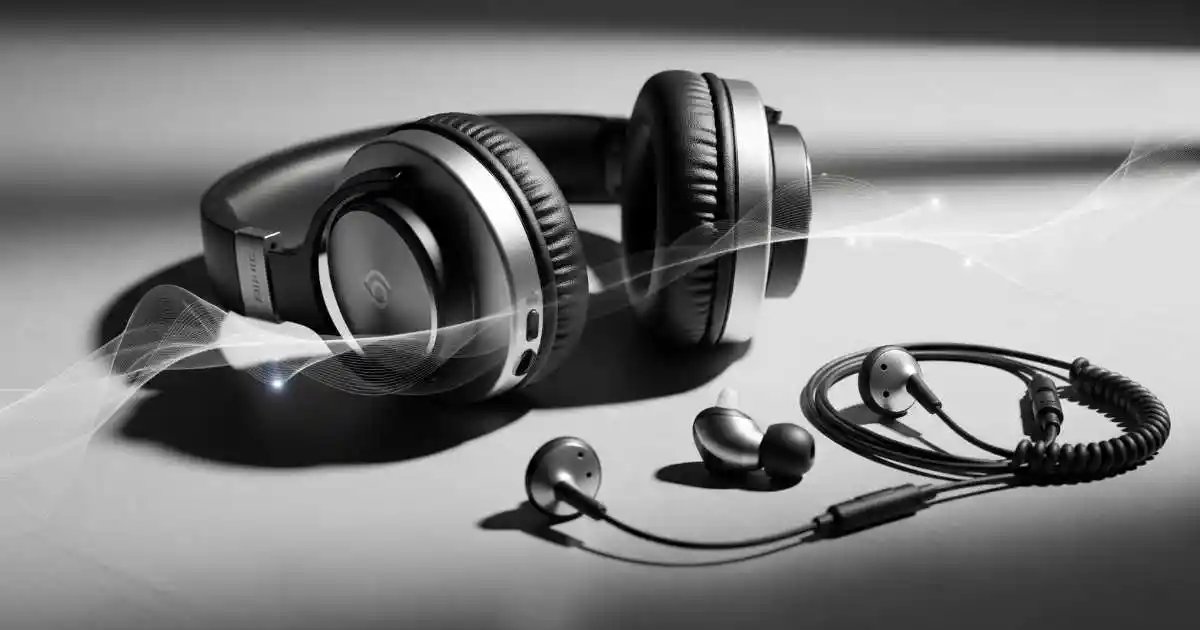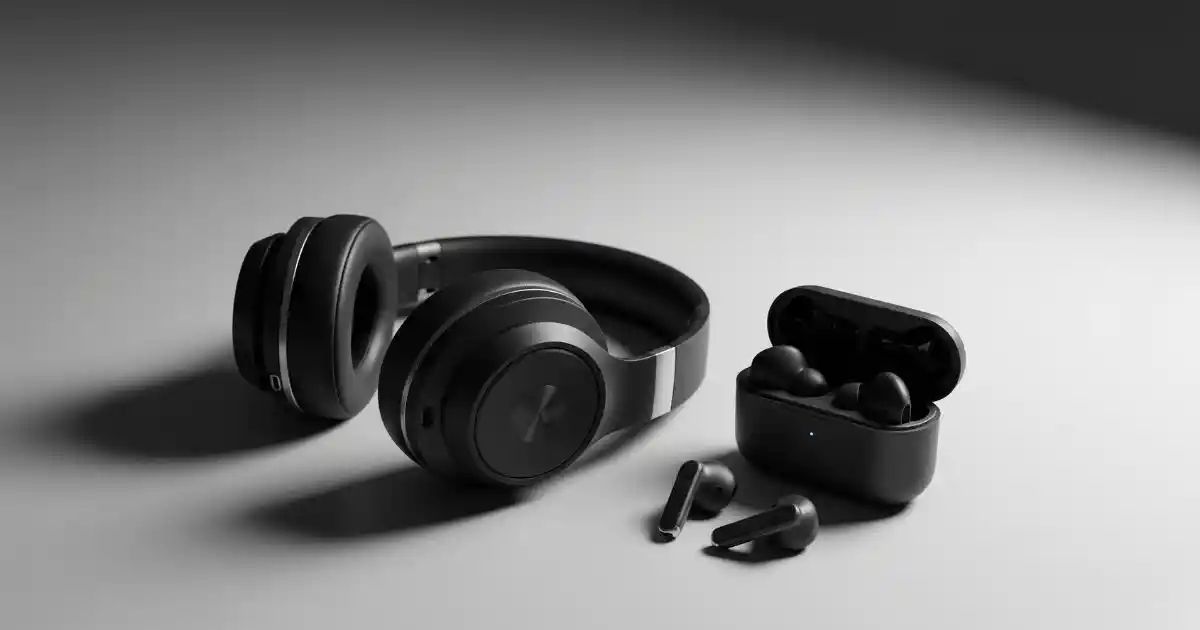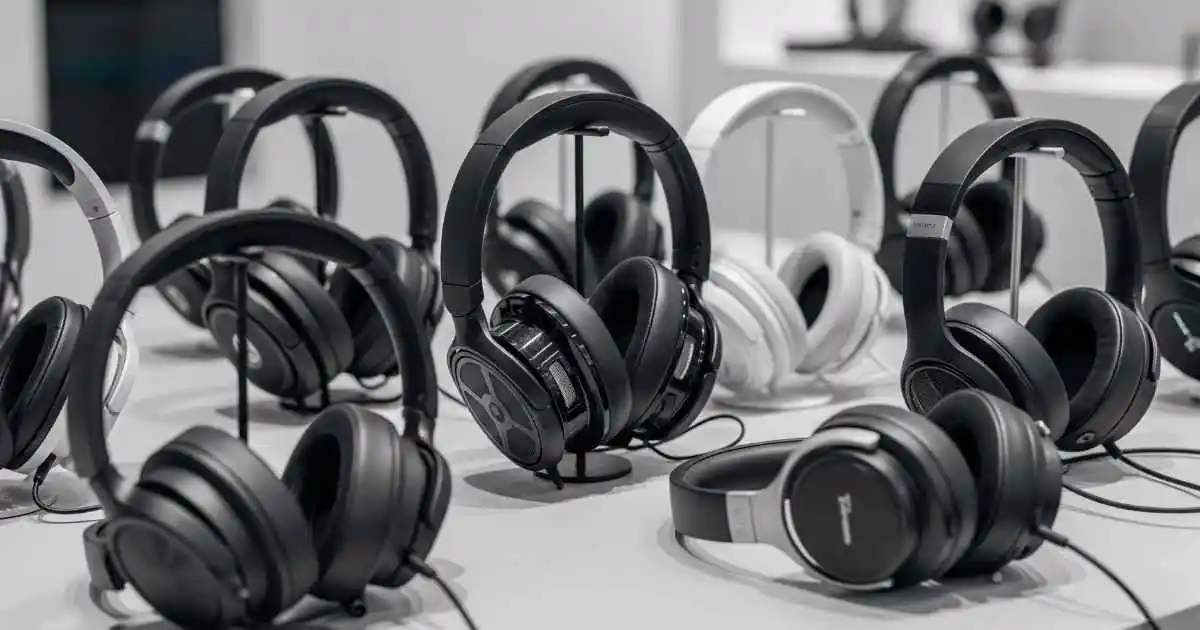Choosing between headphones and earbuds has become a common dilemma. With so many options on the market ranging from budget-friendly earbuds to high-end studio headphones many people wonder which is truly better for music, gaming, and calls.
In this blog, we’ll break down:
- Sound quality (including bass lovers’ favorites)
- Comfort and portability
- Gaming and calling performance
- Health & safety tips
- Types of headphones and earbuds
By the end, you’ll clearly understand which option is best for your lifestyle and audio needs.

Quick Navigation & Previews
- Are Headphones Better Than Earbuds?
- Sound Quality: Which Sounds Better?
- Comfort and Portability
- Best for Gaming, Music & Calls
- Health & Safety: Are Earbuds Safe?
- Types of Headphones & Earbuds Explained
- How to Choose What’s Best for You – Headphones vs Earbuds
- Final Verdict: Which One Should You Choose?
- FAQs
Are Headphones Better Than Earbuds?
If you’ve ever asked yourself, are headphones better than earbuds, the answer isn’t one-size-fits-all. It depends on how, where, and why you use them. Both have unique benefits, and understanding them will help you choose the right audio device for your lifestyle.
Quick Comparison Table
| Feature | Headphones | Earbuds |
|---|---|---|
| Sound Quality | Deeper bass, full soundstage | Sharp highs, less bass |
| Comfort | Bulky but padded | Lightweight, portable |
| Best For | Gaming, studio music | Travel, workouts, casual use |
| Noise Isolation | Better with over-ear models | Moderate, depends on type |
| Health/Safety | Safer at lower volumes | Can affect ear health if misused |
| Price Range | Often higher | More affordable options |
Why Headphones Might Be Better
Immersive Sound Quality:
Headphones are built with larger drivers, which means richer sound, deeper bass, and a wide soundstage. This makes them perfect for music lovers, movie watching, and gaming.
Better Noise Isolation:
Over-ear headphones cover your ears completely, blocking out outside noise naturally. Noise-canceling models take this to the next level, creating a cinema-like experience even in noisy environments.
Long-Session Comfort:
With soft padding and adjustable bands, headphones are more comfortable for hours of use, making them ideal for work-from-home calls, editing, or gaming marathons.

When Earbuds Are the Better Choice
Travel & Portability:
Earbuds are small, pocket-sized, and lightweight, which makes them perfect for commuting, exercising, or quick calls on the go.
Workout-Friendly:
Many modern wireless earbuds are waterproof and sweatproof, which is a big win for gym and running sessions.
Affordable Options:
You can get quality earbuds at lower prices compared to premium headphones, making them accessible to more users.
| Quick Tip |
|---|
| Choose headphones if you want full, cinematic sound, less ear fatigue, and better noise isolation. |
| Choose earbuds if you move a lot, need easy carrying, or listen casually. |
Sound Quality: Which Sounds Better?
When comparing headphones vs. earbuds for sound quality, the difference comes down to bass depth, clarity, and the overall listening experience.
Headphones:
- Provide richer bass and a wider soundstage, making music sound fuller and more immersive.
- Over-ear models are especially great for music producers, audiophiles, and gamers, as they let you hear every detail in songs or in-game effects.
- Noise-canceling headphones enhance the experience by removing background distractions.
Earbuds:
- Emphasize highs and mids, which makes vocals and instruments sound crisp.
- Some loud earbuds with bass exist, but they can’t fully match the cinematic experience of large over-ear drivers.
- Perfect for casual listening, commuting, and workouts due to their portable size.
| Use Case Tip: |
|---|
| If you love immersive music or gaming, go with headphones. |
| If you want on-the-go listening with a touch of bass, wireless earbuds will be enough. |
Comfort and Portability
Comfort and portability often decide whether you keep using a device daily.
Headphones: Comfort for Long Sessions
- The soft, cushioned ear cups gently surround your ears, reducing pressure and discomfort during long listening sessions.
- Adjustable headbands ensure a snug but not tight fit, perfect for hours of gaming, editing, or binge-watching your favorite series.
- Downside: Their size makes them less convenient to carry. You’ll likely need a bag or case, which isn’t ideal for spontaneous use.

Earbuds: Travel-Friendly and Lightweight
- Earbuds weigh just a few grams each, easily fitting into your pocket or a tiny charging case.
- Perfect for active lifestyles: workouts, running, or quick trips.
- Some come with ear tips in multiple sizes to fit snugly without falling out.
- Caution: Wearing earbuds for hours can cause ear fatigue or discomfort, especially if they don’t fit perfectly.
| What’s Right for You? |
|---|
| Long listening or gaming sessions? Go for comfortable headphones. |
| On-the-go or active? Choose lightweight earbuds. |
Best for Gaming, Music & Calls
As an expert who uses both earbuds and headphones daily, we know that the right choice depends on what you need most: gaming, music, or calls.
Gaming:
For gaming, headphones usually win. They offer surround sound that helps you hear exactly where enemies or game sounds are coming from. This is crucial for competitive players who rely on sound cues. Plus, gaming headphones often have noise-canceling boom microphones that deliver clear voice chat without background noise. On the other hand, earbuds are fine for casual gaming on phones but don’t provide the same directional audio or noise isolation you need for serious play.
Music:
When it comes to music, headphones deliver richer sound quality with deep bass and a wide soundstage. This makes them ideal for audiophiles and music producers who want to catch every detail. Meanwhile, earbuds are perfect for casual listening and on-the-go use, especially wireless earbuds that offer good bass and freedom from wires.
Calls:
For calls, earbuds are popular because they’re lightweight, portable, and easy to use with built-in mics. But if you take professional calls or stream online, headphones with boom mics are better. They offer superior mic quality and block out background noise, so your voice sounds clear every time.

Health & Safety: Are Earbuds Safe?
What You Need to Know
Earbuds sit directly inside the ear canal, which makes them more likely to cause hearing problems if used improperly. Listening at high volumes for extended periods can damage your hearing.
In contrast, headphones sit around or over the ears, which puts less direct pressure on the inner ear and generally reduces the risk of damage.
Tips to Protect Your Hearing
- Keep volume below 60% of max.
- Take breaks every 45-60 minutes to give your ears rest.
- Use noise-canceling headphones or earbuds to avoid turning the volume up too high in noisy places.
- Clean earbuds regularly to avoid ear infections.
Types of Headphones & Earbuds Explained
Choosing the right headphones or earbuds can be confusing. To help, here’s a simple guide explaining the most common types, their benefits, and which one might suit you best.
Headphones
- Over-Ear Headphones
Over-ear headphones fully cover your ears with large cushioned cups. They offer:
- Excellent comfort for long listening or gaming sessions.
- Deep bass and clear sound with wide soundstage—perfect for audiophiles and gamers.
- Great noise isolation that blocks outside distractions.
- Ideal for: Studio work, gaming, and home listening.
- Trade-off: They are bigger and less portable.
- On-Ear Headphones
On-ear headphones sit on top of your ears without fully covering them. Benefits include:
- Lightweight and compact design for easy portability.
- Moderate noise isolation, suitable for everyday use.
- Ideal for: Commuting and casual listening.
- Some may cause ear fatigue after extended use.
- Wireless/Bluetooth Headphones
Wireless headphones connect via Bluetooth for cable-free convenience. They can be over-ear or on-ear and offer:
- Freedom of movement without tangled wires.
- Features like active noise cancellation and long battery life on some models.
- Slightly reduced sound quality compared to wired headphones, mainly in budget options.
- Perfect for: Travel, workouts, and daily use.
- Other Headphone Types
- Open-back headphones: Provide natural, spacious sound but let outside noise in. Best for quiet environments like studios.
- Closed-back headphones: Seal sound inside and block external noise, ideal for noisy places and gaming.
Earbuds
- In-Ear Earbuds
These fit snugly inside your ear canal, offering:
- Good noise isolation to block outside sounds.
- Secure fit with different ear tip sizes included.
- Great for: Commuting, workouts, and casual listening.
- May cause discomfort if worn too long.
- True Wireless Earbuds
True wireless earbuds have no cables at all. Benefits:
- Maximum portability with a compact charging case.
- Features like touch controls, voice assistants, and noise cancellation on many models.
- Smaller batteries mean shorter playtime, but cases provide extra charges.
- Ideal for: Active lifestyles and on-the-go use.
- Wired Earbuds
Wired earbuds connect via a cable and offer:
- Reliable, no-charge-needed use.
- Often budget-friendly with decent sound.
- Good for: Simple plug-and-play listening.
- Downsides include cable tangling and less freedom of movement.
- Other Earbud Styles
- Neckband earbuds: Wireless earbuds connected by a neckband for longer battery life and secure fit.
- Sports earbuds: Designed to be sweatproof with extra grip for workouts and running.
Which Should You Pick?
- Want top sound quality and comfort? Choose over-ear headphones.
- Need lightweight, portable options? Try on-ear headphones or in-ear earbuds.
- For exercise and travel, true wireless or sports earbuds are perfect.
- Prefer no charging hassles? Go for wired earbuds or headphones.

How to Choose What’s Best for You – Headphones vs Earbuds
When deciding between headphones and earbuds, the best choice depends on your lifestyle, audio needs, and comfort preferences. Instead of simply asking which is better, focus on which is better for you.
Here’s a clear breakdown to help you make the right decision:
1. Do You Travel Often?
If you’re always on the move, earbuds are your best companion because they are:
- Lightweight and pocket-friendly, fitting in a small case.
- Wireless options eliminate cable hassles on buses, trains, or flights.
- Noise-canceling models can block travel noise without the bulk of headphones.
2. Do You Play Games or Produce Music? → Choose Headphones
Gamers and music creators need accuracy and immersion, which headphones deliver.
- Surround sound and a wider soundstage help gamers locate sounds precisely.
- Studio and mixing headphones reveal every detail of music for producers or editors.
- Noise isolation allows focus without external distractions.
3. Do You Need Deep Bass and Immersive Sound? → Choose Headphones
For audiophiles or movie lovers, headphones are the clear winner:
- Bigger drivers create powerful bass and richer sound than most earbuds.
- Over-ear designs provide the most immersive listening experience.
- Open-back models offer a natural, airy sound perfect for music enjoyment at home.
4. Do You Need Quick Calls and Workout-Friendly Options? → Choose Earbuds
If your focus is hands-free calls, gym sessions, or running, earbuds shine because they are:
- Wireless and sweatproof, making workouts hassle-free.
- Equipped with built-in microphones for easy phone calls and video chats.
- Compact and lightweight, so they won’t get in your way during movement.
| Expert Tip |
|---|
| For all-day comfort and immersive sound: Headphones are better. |
| For mobility, workouts, and casual use: Earbuds are more practical. |
| Some users own both, using headphones at home and earbuds on the go. |
Final Verdict: Which One Should You Choose?
The debate of whether headphones are better than earbuds doesn’t have a one-size-fits-all answer—it all depends on your lifestyle and audio needs. If you want immersive music, deep bass, cinematic gaming, or crystal-clear professional calls, headphones are the best choice. Their over-ear design provides better sound quality, noise isolation, and all-day comfort.
On the other hand, if you value portability, lightweight design, and convenience for workouts or casual listening, earbuds are perfect. Modern wireless earbuds make travel and daily calls easier without the bulk of full-size headphones.
In the end, both headphones and earbuds can serve you well when used safely and according to your lifestyle. Many people even choose to own both—headphones for home and work sessions and earbuds for commuting, workouts, and travel.
FAQs
Q1: Are headphones safer than earbuds?
Yes, headphones are generally safer than earbuds because they sit outside the ear canal. This reduces direct pressure on the inner ear and allows you to listen at lower volumes. Earbuds, if used at high volumes for long periods, can increase the risk of hearing damage. For safety, follow the 60/60 rule—listen at 60% volume for no more than 60 minutes at a time.
Q2: What are earbuds used for daily?
Earbuds are commonly used for hands-free phone calls, music on the go, workouts, commuting, and travel. Their lightweight and portable design makes them convenient for everyday use. Modern true wireless earbuds also support voice assistants, noise cancellation, and touch controls, making them more versatile than basic wired versions.
Q3: Can loud earbuds with bass damage hearing?
Yes. Loud earbuds with enhanced bass can damage your hearing if used at high volumes for long periods. The sound enters directly into your ear canal, which can strain your eardrums and inner ear.
Q4: Do headphones offer better sound quality?
Generally, yes. Headphones provide deeper bass, clearer mids, and a wider soundstage because they use larger drivers than earbuds. This makes them ideal for audiophiles, music producers, and gamers who want a full, immersive sound experience. Earbuds are improving in quality but still cannot fully match the richness and spatial audio of premium over-ear headphones.
Q5: What type of headphones is best for gamers?
The best headphones for gamers are over-ear gaming headsets with surround sound, noise cancellation, and a dedicated boom microphone.
Leave a Reply